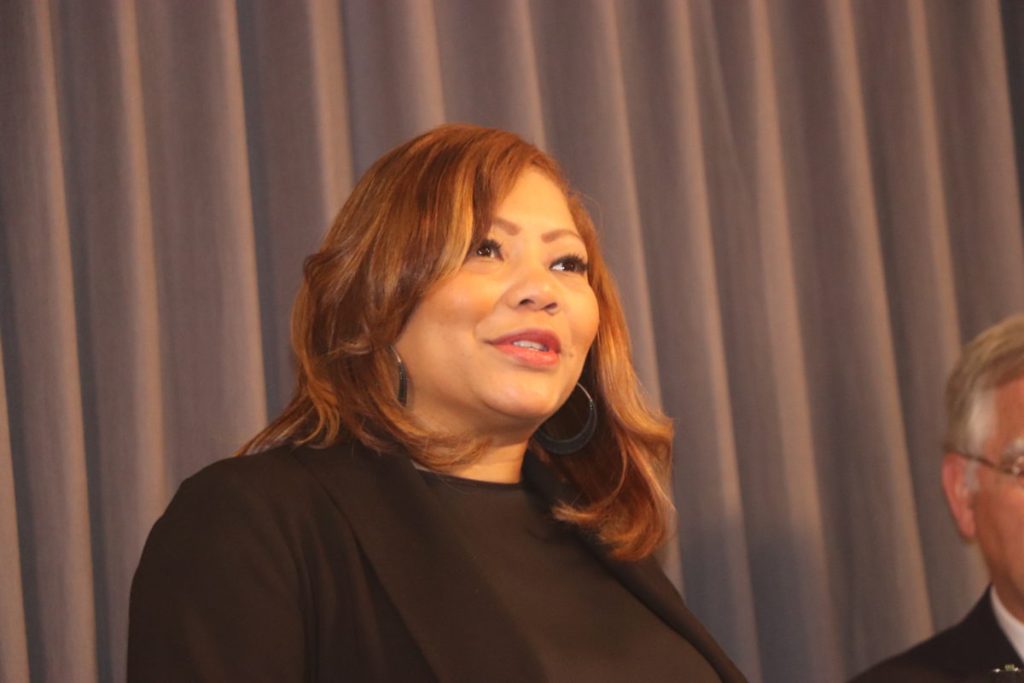NASHVILLE, TN – Dr. Adrienne Battle, Director of Metro schools, announced a phased-in return to schools beginning this week. Grades Pre-K-4 and exceptional needs kids can return Tuesday, February 9; Grades 5 and 9 on Thursday, February 18; Middle School Grades 6-8 on Thursday, February 25; High School Grades 10-12 on Wednesday, March 3.
Parents who opted for virtual learning can continue to do so until the end of the school year.
Battle based her decision on the COVID-19 risk score. Davidson County Public Health officials calculate COVID-19 risk using three metrics: the 7-day average positivity rate (20%), the 7-day average of new cases per 100,000 residents (60%), and the transmission rate (20%).
Last week the risk score fell below 7.0 and has stayed there so Battle made the call. Infections have dropped all over the country. Nobody knows exactly why. Three weeks ago Davidson County and Tennessee were in the “extreme risk” category, according to the New York Times Covid-19 project.
“We are in the process of finalizing our plans for the application of funds for materials, supplies, and additional support measures for students and staff,“ said MNPS spokesperson Sean Braisted. He said that includes additional measures to improve air quality. Braisted said that Metro schools have plenty of PPE (facemasks) and cleaning supplies to disinfect classrooms.
Battle has the support of Mayor John Cooper and a majority of the Davidson County School Board but not Governor Bill Lee. For months, Lee has advocated returning to in-person instruction and has publicly rebuked schools officials of Tennessee’s largest school districts for not returning to in-person instruction.
“It’s time to intervene for our kids,” Lee told state lawmakers last month. Lee called them to a special education session January 19-23.
The General Assembly passed three bills to implement a phonics-based reading program, provide resources for tutoring and mandatory summer school for children who are behind in reading and math, and a bill that will hold educators harmless for poor student test scores. A separate funding bill was passed to pay for some but not all of the $160 million the programs will cost.
During the 4-day session, House Minority Leader Karen Camper, (D-Memphis) complained that Democrats were not brought into planning meetings ahead of time to discuss the measures. Others wondered if there were undisclosed costs local districts would have to pay for.
House Majority Leader William Lamberth (R-Portland) said Tennessee would budget for an additional $40 million in expected costs not covered by the funding bill they passed during the special session.
According to the Tennessean, state lawmakers intend to use $35 million/yr. from unspent Temporary Aid to Needy Family (TANF) funds to help pay for summer school and phonics-based reading instruction.
Senator Jeff Yarbro (D- Nashville) criticized the rush to pass education bills with little time for debate and consultation which proposed laws get during regular legislative sessions. One law would hold 3rd-graders back if they don’t pass state assessment tests, do not attend summer school, or enroll in year-round tutoring.
“That is god-awful policy, and anyone who pays attention to these things knows that. Now the reason the legislature doesn’t know it is we didn’t talk to any educators this week,” Yarbro said.
Yarbro said lawmakers rushed to judgment and did not hear from school superintendents, principals or teachers about the bills they voted on during the special session.
“You can’t say follow the science and keep schools closed. You can say ‘I believe in public education’ and keep schools closed, and you can’t say you are putting needs of students first and keep schools closed,” Lee told lawmakers.
As we have reported, Metro schools have followed the science and kept learning virtual because health officials told them it was unsafe to open the schools in the middle of a pandemic. (see Teachers)
As we have also reported, Lee ignored the advice of health experts when he opened up businesses last May with disastrous consequences. (see Testing)

This is not the first time Lee has ignored local school officials in pursuit of his own agenda. Lee pushed a controversial voucher bill that passed in April 2019 with some alleged vote buying but it did not become law. There was a lawsuit and Lee lost. Democrats say they were not invited to weigh in before the special education because Lee didn’t need or want them to.
”Tennessee has become a national leader for embracing the courage to get back into the classroom and showing that it can be done, “ Lee told lawmakers. Brave or bullying, like beauty, depends upon who is doing the looking.
A late-filed bill filed by Republican leaders will be considered after the General Assembly reconvenes February 8. If passed, the bill would cut state funding to districts that do not have at least 70 days of in-person instruction this school year and 180 days next year.
Democratic lawmakers say the bill is punitive. And they say it would violate the independence of local school districts. If it passes, there will likely be another lawsuit.
Democrats also said that the Special Session on Education missed an opportunity to address new dedicated funding for public schools. They say it’s the biggest problem holding back students and local governments.
According the National Education Association, Tennessee ranks 46th in the country for per student funding, One of the main reasons for this funding deficit is the broken funding formula known as the Basic Education Program (BEP).
For example, state law mandates student-teacher ratios but in some districts the BEP does not provide enough funding to pay for the teachers and support staff required to meet those requirements.
Ninety-six percent of school districts spend more than what the formula generates for them. Collectively, local governments are spending $1.7 billion above what is required by the BEP funding formula to meet the real needs of their communities. Increased local property taxes wind up paying for the chronic shortfalls in state funding of public education.



